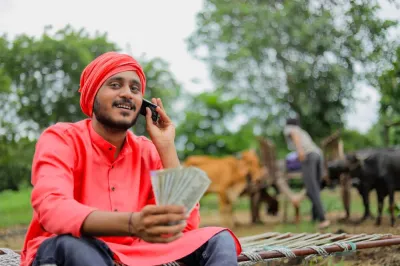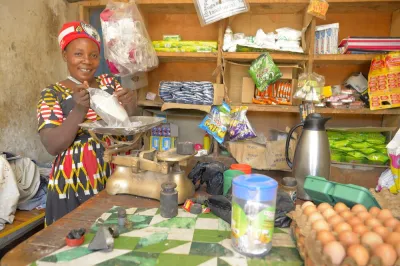COVID-19 FinDev Weekly Update | 04-10 June 2020
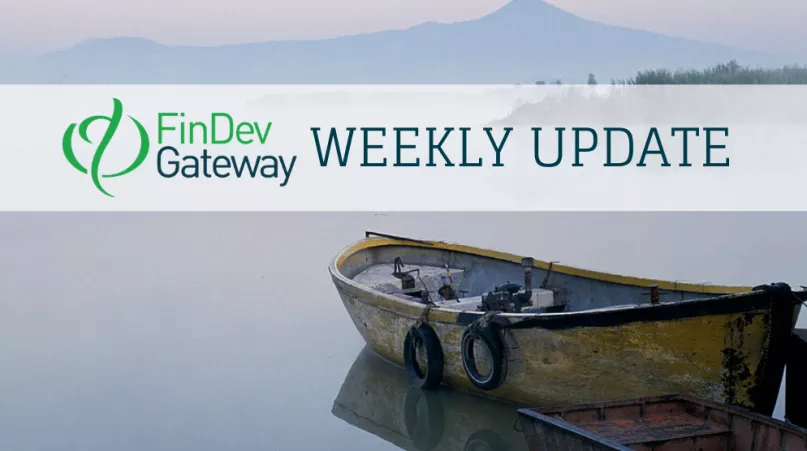
FinDev Gateway has created this COVID-19 weekly update with the latest and most relevant knowledge resources for financial inclusion as they become available. Sign up to receive FinDev's weekly update each Friday with a summary of the main issues covered during the week.
If you have content to share in our weekly update, please submit here or contact us directly.
Do you find the update useful? How often would you like to receive it? Take a moment to let us know >>
Global Summary
- Responding to the need for better data on the impact of COVID-19 on microfinance institutions (MFIs), CGAP has launched the Global Pulse Survey of Microfinance Institutions. The data will help MFIs and the institutions that support them to make informed decisions as they deal with the ongoing crisis. All interested MFIs can participate in the survey at www.atlasdata.org/pulse.
- According to the World Banks’ latest estimate, the global economy is headed for the deepest recession since the Second World War. Countries with large informal sectors suffer heavy toll.
- In a recent blog post, CFI’s Mayada El-Zoghbi argues that individual actions and ready-made market solutions are not the answer to the economic fallout from the pandemic.
- Recent feedback gathered by CGAP shows how COVID-19 has affected agent networks in Africa and Asia, where revenues of providers and agents have declined, mostly as a result of transaction fees being waved at the request of governments.
- IFC has issued guidance for insurance providers on meeting the needs of women during the pandemic; in less than a decade, women will represent a $1.7 trillion opportunity for the insurance industry. In Indonesia, a technology platform and an insurance provider have partnered to offer health microinsurance to low-income microbusiness owners.
Asia
- Banking agents in India are providing essential access to financial services during COVID-19, but need support to deal with health risks, liquidity and security. Female agents or “bank sakhis,” have been crucial for delivering G2P payments to rural women.
- Various institutions have announced support for women entrepreneurs in the region, including Grameen Foundation and J.P. Morgan in the Philippines and the IFC in Sri Lanka. Also, the UN ESCAP and Good Return formed a multi-country credit guarantee fund to support women-led SMEs in Cambodia, Nepal, Fiji and Samoa.
- The Monetary Authority of Singapore launched a $1.75 million global fintech challenge seeking solutions that help the financial sector deal with COVID-19 and climate change.
- Indian fintech Paytm, a digital payments giant backed by AliPay and Softbank, is expanding into online micro-lending, while other online lenders face an existential crisis.
- In Indonesia, COVID-19 restrictions are disrupting the value chains for fast-moving consumer goods. CGAP recommends quick action to inject working capital at the distributor level to keep staples on store shelves.
Africa
Some articles and knowledge resources referenced in this section are in French.
- According to a World Bank phone survey on businesses in Ethiopia, firms in Addis Ababa have resumed their activities, but 40 percent of them reported no earnings in April. The Mastercard Foundation has launched an emergency program to help micro and small enterprises remain solvent.
- The Peasant Farmers Association of Ghana is advocating for a stimulus package to help smallholder farmers recover.
- Mobile money usage in Nigeria increased by 15 percent in March, according to the Nigeria Interbank Settlement Scheme.
- A survey by Nigeria’s National Bureau of Statistics found that 29 percent of households have had to use their savings in response to the economic shocks caused by the pandemic.
- While much has been said about the impact of COVID-19 on international remittances, the decline of domestic remittances, sent by migrants within countries, will have important implications for rural livelihoods in Sub-Saharan Africa.
For more on Africa, check out the latest Portail FinDev Weekly Update in French.
Latin America and the Caribbean
Most articles and knowledge resources referenced in this section are in Spanish.
- The World Bank has revised downward its forecast for the region’s economy in 2020, predicting a shrinkage of 7.2 percent, compared to the previous estimate of 4.6 percent.
- In Peru, 60 percent of the rural population had no food at some point during the emergency as rural households lost their non-farm income and had to rely exclusively on the food they produced or could exchange with neighbors.
- In Colombia, digital credit is booming; in May, the volume of digital loans was over 50 percent higher than the volume from the previous two months combined, according to the Colombia Fintech Network.
- In Argentina, the government launched a financial education campaign for older adults in digital finance. The purpose is to discourage in-person banking for those at higher risk during the pandemic.
- After breaking the record in the previous month, remittances to Mexico plunged 28.5 percent in April due to job losses among migrants in the U.S. as well as restrictions on mobility at the border.
For more on LAC, check out the latest Portal FinDev Weekly Update in Spanish.
Arab World
- Two tools from the Social Performance Task Force (SPTF) are now available in Arabic: the COVID-19 Client Interview Tool to help financial services providers understand their clients’ needs during the pandemic, and the Crisis Checklist based on the Universal Standards for Social Performance Management.
- Vulnerable workers and small scale businesses in Lebanon are facing multiple crises, according to a recent ILO report which provides a set of recommendations to mitigate the employment, livelihoods and business continuity challenges.
- Findings from the first round of phone interviews conducted by the Tunisian National Institute of Statistics in partnership with the World Bank revealed the negative socio-economic impact of COVID-19 on the poorest 20 percent of Tunisian households, especially those headed by self-employed workers and located in rural areas.
For more on the Arab world and resources in Arabic, check out the latest FinDev Weekly Update in Arabic.
COVID-19 Resources
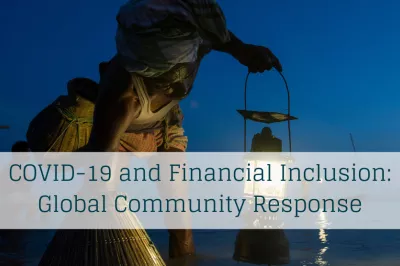
Global Community Response to COVID-19
A list of organizations offering resources and insights on COVID-19 & microfinance
FinDev Coronavirus Data Tracker
Data relevant for financial inclusion - find out who is tracking what
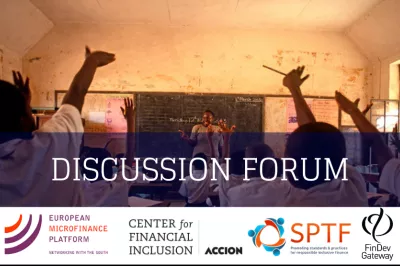
New Data Source
View our complete Data Tracker listing most important sources and trackers by the level of their relevance to the sector.
Phone Survey Data: Monitoring COVID-19 Impact on Firms and Households in Ethiopia
To monitor the impacts of the COVID-19 pandemic on Ethiopia’s economy and people and inform interventions and policy responses, the World Bank Ethiopia team, in collaboration with the government, designed and implemented two high-frequency phone surveys, one with firms and one with households.
Recent Publications
For a complete list of publications and to learn how you can share your research with us, visit FinDev's Publications page.
COVID-19 and the Insurance Industry: Why a Gender-Sensitive Response Matters
International Finance Corporation (IFC) | Jun 2020
This guidance note highlights best practices from insurance companies on how they can support female employees, customers, and agents during the pandemic.
Global Economic Prospects
World Bank | Jun 2020
This edition of the Prospects assesses the impacts of the pandemic and analyzes possible courses and outcomes. It presents clear actions needed by the global community and national policymakers—to limit the harm, recover, and rebuild better and stronger than before.
Tanzania Economic Update
World Bank | Jun 2020
This study addresses the impact of COVID-19 with one chapter focusing on t potential of the digital economy and its role in strengthening the effectiveness of the response to COVID-19 and becoming a key driver of Tanzania’s recovery.
Monitoring COVID-19 Impacts on Firms in Ethiopia
World Bank | Jun 2020
This note summarizes the results from a high-frequency phone survey of firms to allow for a better understanding of the effects of and responses to the COVID-19 pandemic on firm operations, hiring and firing, and expectations of future operations and labor demand.
Monitoring COVID-19 Impacts on Households in Ethiopia
World Bank | Jun 2020
This survey brief summarizes the results of the first round of high-frequency phone survey to offer a better understanding of COVID-19 effects on households in near real time to support new, evidence-based responses.
Liquidity in Lockdown: How Can India’s Small Finance Banks Manage?
M-CRIL | May 2020
This Advisory Note attempts to estimate the magnitude of the liquidity shortfall for small finance banks resulting from the current six-month moratorium.
Towards Resilience: Advancing Collective Impact in Protracted Crises
Mercy Corps | May 2020
This paper urges foreign assistance — humanitarian, peace, and development — to align behind a resilience agenda, and pursue collective action to secure better outcomes for populations affected by the pandemic.
Cybersecurity Leadership Principles
World Economic Forum | May 2020
This note urges leaders to strategically manage information risks, work towards a culture of shared cyber-risk ownership across organizations and take a strategic approach to cyber resilience using lessons learned during the COVID-19 pandemic.
View All Publications Related to COVID-19 >
Blogs & Opinion
If you have a blog idea and would like to write for the FinDev Blog, please see our review our guidelines. We do not cross-post blogs that have been published elsewhere, but if you wish to share an existing blog post in our next FinDev Weekly Update, you can send it to us using our contact form.
Agent Networks
How Is the Pandemic Affecting Agents? Here’s What Providers Tell Us
09 Jun 2020 | Emilio Hernandez | CGAP
Instant Liquidity Support for Mobile Money Agents
05 Jun 2020 | Michael Rothe | FinDev Gateway
We Are Looking Up To Business Correspondents In The Pandemic; But What Are They Looking At?
05 Jun 2020 | Ishita Sharma, Saloni Tandon, Mimansa Khanna & Anveshi Gupta | MicroSave Consulting
Gender Gap Narrowing “Bank Sakhis” Take Crucial G2P Support the Last Mile During COVID-19
04 Jun 2020 | Alreena Pinto & Amit Arora | CFI-Accion
Financial Services for MSMEs
With the Right Support, Fintech Alternative Lenders Can Help Small Businesses Weather the Crisis
10 Jun 2020 | Gian Boeddu, Ana Fiorella Carvajal, Jennifer Chien, Ivor Istuk, Ligia Lopes & Margaret Miller | World Bank
Extending Insurance in Times of Crisis: How an Innovative Partnership Is Serving Low-Income Micro-Business Owners in Indonesia
10 Jun 2020 | Carlie Joselowitz | NextBillion
Receivables Finance: Innovative Approaches to Unlocking Access to Finance for African SMEs
08 Jun 2020 | Edmund Higenbottam & Patrick Ball | Making Finance Work for Africa (MFW4A)
Indonesia’s Retail Credit Crunch Requires Action to Keep Shelves Full
05 Jun 2020 | Paul Reynolds, Joep Roest | CGAP
Policy
COVID-19 Reveals the Limits of Individual Action and Market-Based Solutions
08 Jun 2020 | Mayada El-Zoghbi | CFI-Accion
Why Credit Reporting Matters in Formulating Policy During COVID-19 Response and Recovery
03 Jun 2020 | Pratibha Chhabra, Shalini Sankaranarayanan & Collen Masunda | World Bank
Socio-Economic Impact
Back to an Empty Market
10 Jun 2020 | Julie Zollmann, Anne Gachoka and Catherine Wanjalan | FSD Kenya
COVID-19 Is Reducing Domestic Remittances in Africa: What Does It Mean for Poor Households?
09 Jun 2020 | Samik Adhikari | World Bank
Doing Research
Coping Measures for “Measurement” in the Time of COVID-19
09 Jun 2020 | Rahul Chatterjee & Monica Dutta | MicroSave Consulting
News
For the latest news on the impact of coronavirus on financial inclusion, visit our News listing pages.
CGAP Launches Global Microfinance Survey to Inform COVID-19 Response
| CGAP | Global
Accelerating Digital Transformation During the Coronavirus Crisis
| Advans | Global
Singapore: MAS to Host $1.25 Million COVID-19 and Green Finance Challenge
| Finextra | Singapore
View All News Related to COVID-19 >
Webinars
For the latest events - hosted by organizations worldwide - exploring the impact of coronavirus on financial inclusion, visit our Events listing page.
The Impact of COVID-19 on Financial Diaries Respondents in Kenya
11 Jun 2020 | BFA Global , Financial Sector Deepening Trust Kenya (FSDK)
COVID-19 Gendered Impacts on Livelihoods in Africa
15 Jun 2020 | FinEquity
The Impact of COVID-19 on International Remittances and Financial Inclusion
16 Jun 2020 | International Growth Centre
Quick Links:
FinDev Guide
About this guide
Published
Topics
Contributed by a global financial inclusion community member. Share your lessons learned
Write for usLeave a Comment
Comments on this page are moderated by FinDev Editors. We welcome comments that offer remarks and insights that are relevant to the post. Learn More
